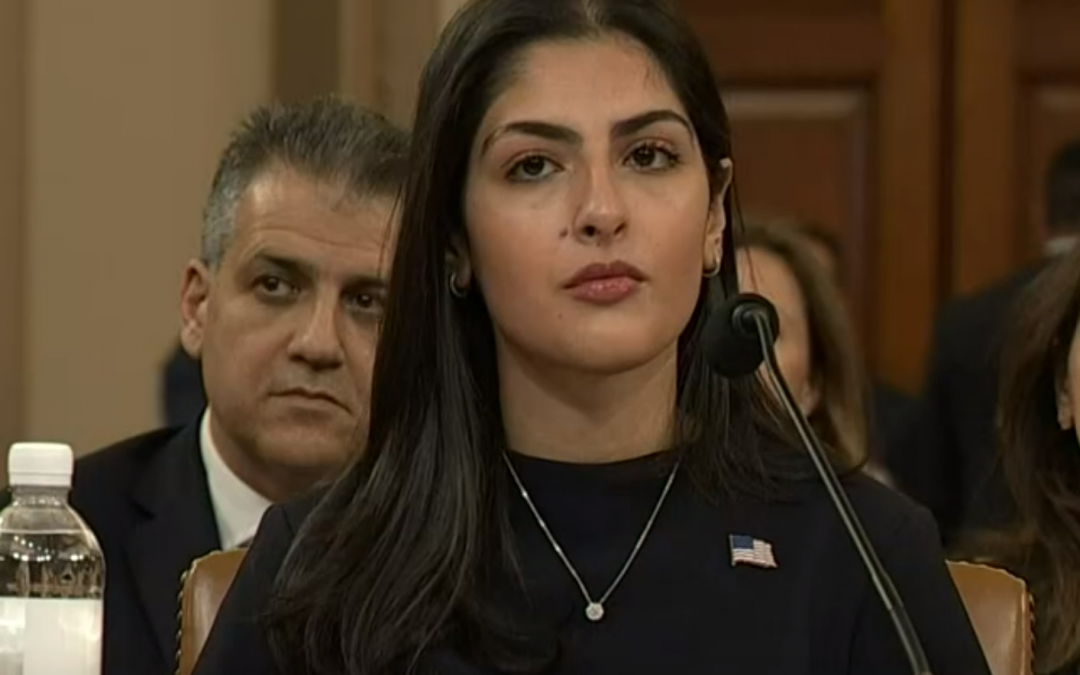WASHINGTON — In a powerful testimony before the House Ways and Means Committee on Wednesday, Talia Dror, a junior at Cornell University and the daughter of a Jewish-Iranian immigrant, explained how she never imagined that the antisemitism her family faced in Iran would follow them to the country where they sought refuge.
“As a Jewish student leader, my community is terrified to walk around the school they pay to attend because they are afraid of getting threatened, assaulted or killed,” Dror said.
Cornell briefly suspended classes on Friday, October 27 after one student posted threats to kill and injure Jewish students on campus.
“Jewish students on campus have been courageous and resilient,” Dror continued. “But we shouldn’t need to be. American-Jewish students on campus deserve better.”
Dror’s testimony evoked an emotional response throughout the room with those in attendance breaking into applause and some even crying.
In the five weeks since violence broke out in the Israel-Hamas War, reported antisemitic incidents in the U.S. have increased over 300%. Of the 832 incidents reported to the American Defamation League’s Center for Extremism, at least 124 have occurred on college campuses.
Republican and Democratic members of the committee met Wednesday to better understand the rise of antisemitism on campuses and to discuss the best methods to combat it. While committee members agreed that Jewish students should not fear for their safety on campus, they differed on how best to approach the issue of violent speech on college campuses.
Rep. Brad Wenstrup, R-Ohio, suggested cutting off federal funding to colleges and universities that allow antisemitism to persist on their campuses. He underscored for one witness, “This government lends a lot of money to universities. I will leave it at that.”
Wenstrup’s views mirrored those expressed by many of the Republican party’s presidential candidates during last week’s third Republican presidential debate. However, unlike the others, Vivek Ramaswamy warned against censoring students.
“We don’t quash this with censorship because that creates a worse underbelly. We quell it through leadership by calling it out.” Ramaswamy said.
On Wednesday, Democrats including Rep. Jimmy Panetta, D-Calif., emphasized the need to uphold free speech, but distinguished free speech from speech that threatens the very identity of an individual or group.
“I do believe that we must uphold the principles of free speech. However, we can’t use that as a shield to hate speech that consists of specific threats of violence targeted against a specific group,” Panetta said.
Although the Ways and Means Committee called Wednesday’s hearing to address antisemitism on campus, many of the Democratic members stressed that speech attacking any specific groups cannot and should not be tolerated across college campuses.
“While deplorable antisemitic activities have been on the rise, certainly, there have also been troubling acts and hate speech against Muslim students across the country,” Rep. Lloyd Doggett, D-Texas, said.
Between October 7 and November 4, the Council on American-Islamic Relations received a total of 1,283 requests for help and reports of bias. The nation’s largest Muslim civil rights and advocacy organization, the Council on American-Islamic Relations released that the number of incidents reported in the last month reflected a 216% increase over the previous year.
The organization did not respond to the Medill News Service’s request for a comment, but did share a November 9th press release. “American Muslims are facing the largest wave of Islamophobic bias that we have documented since then-candidate Donald Trump’s Muslim Ban announcement in December 2015,” Corey Saylor, research and advocacy director of Council on American-Islamic Relations, said in a statement.
While most witnesses at Wednesday’s hearing focused on antisemitism, Jonathan Greenblatt, CEO and national director of the Anti-Defamation League, recognized the need to protect all students, and specifically Muslim students, during these times of rising tensions.
“We need the Jewish and Muslim communities in this country … to realize that we need dignity and equality for Palestinians. But it will only happen when Israelis also have safety and security,” Greenblatt said.
Wednesday’s hearing ended with recommendations to strengthen the national response to antisemitism and investigate the connection between U.S. groups and terrorist organizations.
One recommendation was to expand the Nonprofit Security Grant Program which provides additional funding to campus organizations at high risk of terrorist attacks. Other recommendations were to support and fund the implementation of the national strategy to counter antisemitism, and for universities receiving federal financial assistance to implement Title VI, which prohibits discrimination on the basis of race, color and national origin.

